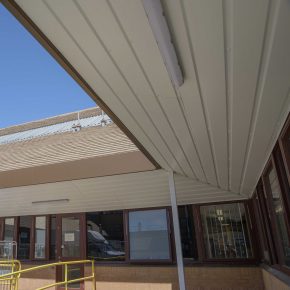
Why our next government should build the case for fire resilience
Author: Iain Cox – Chairman of the Business Sprinkler Alliance
Past Governments have put in place measures to ensure that the UK, its economy and its businesses are resilient to events which can be expected, but which cannot be avoided: flooding, winter cold snaps, terrorism and cyber-crime are all on the resilience agenda and the government has invested substantially to reduce the threat of each.
Absent from this agenda is fire. Successive Governments have implemented policies and campaigns which have had the very welcome effect of reducing the number of fire-related injuries and deaths, but fires still start in businesses and homes across the country every day and the costs to UK plc, the national finances and the economy continue to rise. The Fire and Rescue Service do their utmost to mitigate the impacts but many of these fires, in particular fires in industrial and commercial buildings, are costly: many result in severe damage or destruction of a business; significant disruption to local transport routes; residential and/or school evacuations; local health and safety concerns because air and water pollution or power and water supply interruptions; job losses whose impacts ripple out through the community; and even loss of life. These fires happen week in week out. And the annual estimated cost to the UK is more than £8 billion and rising.
By comparison, figures of £1billion have been put to the Somerset floods of 2014; up to £5 billion for the floods of 2015; and £4.8 billion for the 2015 cold snap. Cyber-crime is estimated to have cost UK businesses £1billion in 2016 and the economy as a whole £11 billion. Significant Government action is seen as appropriate because the events are sudden, destructive and widespread or because the threat is new, evolving and can be very personal and frightening.
Conversely, while the cost of fires on society and the economy are comparable, because the impacts of fires are distributed across the year and across the country – national press reports are rare and the urgency for action to effectively protect against fire and to minimise these costs is missing.
The Business Sprinkler Alliance believes this must change. We believe the next Government should put fire on the resilience agenda and commit to actions designed to reduce the impact of fire on the country, the economy and on UK plc. The most efficient and effective way to do this is to ensure that when fires start they are quickly extinguished so that damage is minimised. Fire sprinkler systems do just this – they make buildings and businesses resilient to the impact of fire because they automatically control or even put out the fire before the FRS arrive with the result that the business can be up and running again usually within hours of the incident. Three straightforward actions by the next Government would help ensure a greater use of fire sprinkler systems and so enhance UK plc’s resilience to fire:
Firstly, the government can undertake a long overdue review of the Fire Safety Guidance of the Building Regulations. This needs to start soon because the current guidance is woefully out of date. Moreover, the current Guidance is only designed to ensure life safety of occupants. We believe the Guidance must also be designed to optimise property protection in the event of a fire.
Secondly, the Government should remove sprinklers from the classification as “plant and machinery” for the purposes of the Business Rates – this classification causes a rate increase for buildings fitted with sprinklers. We believe that this creates a perverse disincentive to install equipment which would save a building and business in the event of a fire and should therefore be changed.
And thirdly, the Government should advise and inform businesses about the threat that fire presents and what they need to do to effectively protect themselves from fire. Coupled with the first two actions such an information outreach programme would heighten awareness of the risk of fire and so encourage business owners to make their buildings and companies resilient to the impact of fire.
The Business Sprinkler Alliance therefore wants the new Government to acknowledge the threat that fire presents on a daily basis to businesses; wants the new Government to recognise the benefits the country will accrue by making the buildings of the future safe and sustainable; and wants the new Government to take 3 straightforward policy decisions which will enhance the resilience of UK Plc, which will make the task of the FRS safer, easier and cheaper and which will benefit the national finances, the economy and the wider society.
Latest news

26th April 2024
Alumasc Skyline and Rainwater package specified at Weston-super-Mare Hospital
A package of products from Alumasc Water Management Solutions (AWMS) has been used for the external refurbishment of the roofline at Weston General Hospital in Weston-Super-Mare.
Posted in Aluminium Products, Articles, Building Industry News, Building Products & Structures, Building Services, Building Systems, Case Studies, Cladding, Drainage Services, Drainage, Guttering, Soffits & Fascias, Fascias, Restoration & Refurbishment, Retrofit & Renovation, Roofs, Walls
26th April 2024
Hush Acoustics optimises fleet operations by securing FORS Gold accreditation
Hush Acoustics has invested in the safety and sustainability of its commercial vehicle fleet by achieving Gold status in the Fleet Operator Recognition Scheme (FORS).
Posted in Acoustics, Noise & Vibration Control, Articles, Building Industry News, Building Products & Structures, Building Regulations & Accreditations, Building Services, Ceilings, Facility Management & Building Services, Floors, Health & Safety, Insulation, Restoration & Refurbishment, Retrofit & Renovation, Site Preparation, Sustainability & Energy Efficiency, Walls, Waste Management & Recycling
26th April 2024
Safeguard Europe: Penetrating damp - how to diagnose the damage
As Safeguard gets ready to deliver another informative session of one of its most popular webinars, the company outlines some of the most common reasons for rain penetration through brickwork.
Posted in Articles, Bricks & Blocks, Building Industry Events, Building Industry News, Building Products & Structures, Building Services, Continuing Professional Development (CPD's), Damp & Waterproofing, Facility Management & Building Services, Information Technology, Posts, Render, Restoration & Refurbishment, Retrofit & Renovation, Seminars, Training, Walls
25th April 2024
ADSA: Competence Initiative Makes Progress
The Joint Competency Initiative (JCI), in which the Automatic Door Suppliers Association (ADSA) is involved, is finalising its first framework for installers within the door, gates and shutter industry.
Posted in Access Control & Door Entry Systems, Architectural Ironmongery, Articles, Building Associations & Institutes, Building Industry Events, Building Industry News, Building Products & Structures, Building Regulations & Accreditations, Building Services, Continuing Professional Development (CPD's), Doors, Facility Management & Building Services, Health & Safety, Innovations & New Products, Publications, Research & Materials Testing, Restoration & Refurbishment, Retrofit & Renovation, Security and Fire Protection, Site Preparation
 Sign up:
Sign up: